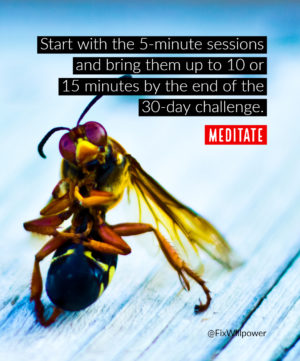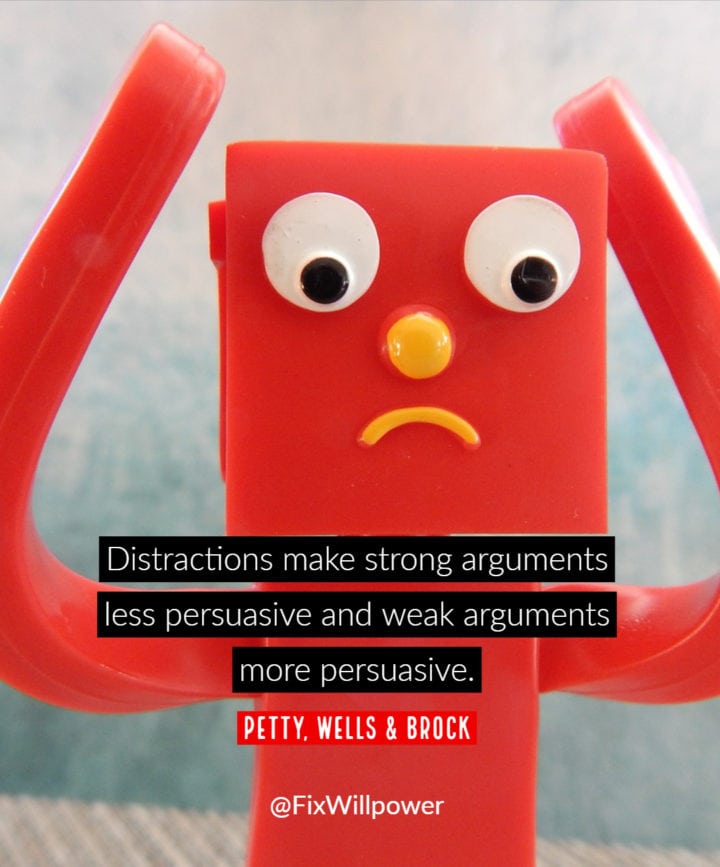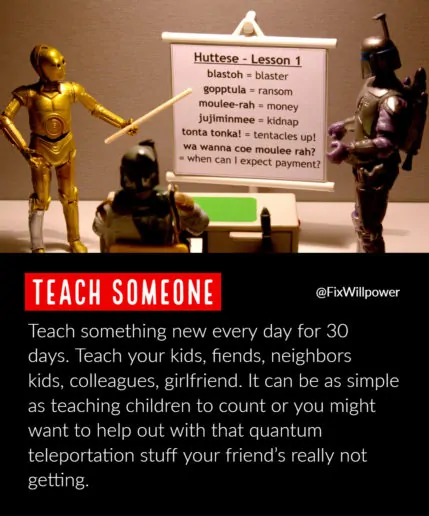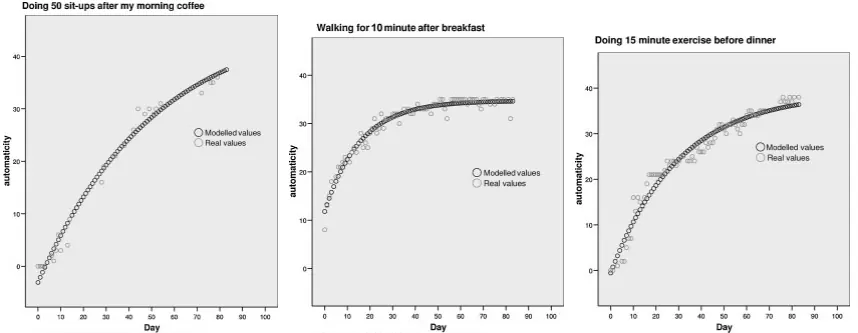
30-day challenges help you build new habits and work as willpower exercises.
Willpower is the foundation of most of your achievements.
If you want something, then you need to work at it until you reach your goal. But, it takes 10,000 hours of practice to master something, and that means real exercising to get better results.
2020 is here!
How are your New Year’s resolutions going? Start a 30-day challenge this year. You don’t have to start on January 1st. You can start today. You may even go for a 90-day challenge.
For this, you need willpower.
Fortunately, research has found that willpower is like a muscle. If you train it, it will get stronger. Another study shows that it takes on average 66 days to make a habit automatic, but you get really big increases in the first 30 days.
12 personal challenge examplesSo I decided to put the two together and selected 12 habits I would like to have and are general enough for others to try.
A year of challenges: every 30 days, you will start a new willpower challenge. By the end of the 30 days, you will evaluate if you want to continue with the forming of this habit, or you will drop it and treat it just as a willpower exercise.
I strongly suggest you select 30-day challenge ideas you want to keep. You will be more motivated by that. From the willpower exercise point of view, you could just try to avoid saying the word “and.”
The New Year’s resolutions season is over, but look at the tactics that actually help you stick to what you promise to yourself. Read: New Year’s Resolutions You Can Keep.
Twelve 30-Day ChallengesHere are the twelve 30 day challenge ideas for 2020.
1. Become an early riserDifficulty: Easy to medium
Minimum time: 0 minutes
 Waking up early is really easy for most people, even if you don’t know it yet.
Waking up early is really easy for most people, even if you don’t know it yet.
I thought I was a night person for years but found out that if I go to bed early; I wake up early and have amazing energy in the first hours of the day. Read about the benefits of rising early.
What do you need to do?
Set your alarm 3 minutes earlier every day. By the end of the 30 days, you will wake up 90 minutes earlier. However, you need 7-8 hours of sleep every day, so adjust your bedtime accordingly.
It has huge benefits if you wake up early, but it takes some time to work your schedule and social life around 5 AM wake-up time.
Keep in mind that the most important thing is to wake up at the same time.
Start by slowly moving your wake-up time earlier. After you get to where you want to be, stick to it. Wake up at the same time every day.
2. Exercise dailyDifficulty: Hard
Minimum time: 20 to 60 minutes
In all the 30-day challenges, exercise ranks probably at the top, and you can do that with just daily walking.
If you can walk, this should be easy for you. If you haven’t moved a muscle in 10 years, start with 10-minute walks. Add just one minute every day, and you will get to 40-minute walks by the end of the challenge. If you don’t have any grandiose fitness goal, this habit should keep you healthy for years to come.
If you have other fitness goals and you are training regularly, add the 40-minute walk to the rest days. Walking for 40 minutes during your rest day will not mess up your training plan and helps to maintain momentum.
Walking for 40 minutes every day is the best thing you can do for your health. Watch a video about the benefits of daily walking.
What if I’m exhausted?
Don’t skip!
The key is to create a habit.
Even if you don’t feel like it, go for a 1-minute walk. Maybe you can stretch it to 2 minutes, but don’t skip.
3. Meditate daily
Difficulty: Medium
Minimum time: 10 to 30 minutes
Meditate 5-10 minutes every day. Sit in a comfortable position, close your eyes, and concentrate on your breathing. In the beginning, you will find it helpful to repeat in your mind in-out-in-out… Your mind will wander off, and you must force yourself back to concentrating on the breathing. And again, off you go. Notice and focus on breathing again. The constant mental effort is the weight that strengthens your willpower. Don’t worry about drifting off, just get back.
Start with the 5-minute sessions and bring them up to 10 or 15 minutes by the end of the 30-day challenge. After you have mastered the 30-day meditation challenge, you can dig into more advanced forms of meditation. How to meditate in 10 easy steps.
Meditation is an inner experience, and it’s hard to know if you are doing it “right.”
There are two basic types of meditation:
Focusing on something, a mantra, mindfulness-like body scan, or just “breath in, breath out.”
Silent meditation is something where you try to cease all thought.
I practice silent meditation. What I do is basically try to shut up mentally for extended periods.
Your mind will start to wander.
You catch yourself and shut up again.
The cycle will repeat itself and will always take your mind back to silence.
Over time the silent stretches start to get longer and longer.
I have done it 150 days in a row, and it has become a lot easier.
4. No distractionsDifficulty: Medium
Minimum time: 0 minutes
Statistics show that it’s a good day at work if you get 30 minutes of uninterrupted time to think about the problems at hand. There are the old emails in your inbox constantly nagging in your subconscious mind; the phone is ringing, IM is demanding attention, you’ve got mail notification, text messages. Shut it all off for 30 days and see what happens.
Put the phone in silent mode. Silent mode means that you will answer the phone only if you don’t have any other important business at hand. Don’t answer a phone when you are talking with someone in person. Disable email notifications, set two or three times in a day that you will work with email, empty email every day, turn off instant messaging, or put it in do not disturb mode.
One of my friends switched back to the old-school dumb phone to avoid the allure of the temptations in his smartphone.
You don’t have to be that extreme.
It seems almost impossible, but by the end of the 30-day challenge, you will be more relaxed and get to do the things that really matter to you.

Distractions make strong arguments less persuasive and weak arguments more persuasive. ~ Petty, Wells & Brock, 1976
As part of no distractions challenge, you may want to try various methods of avoiding distractions. For example, do not multitask and take on a 30-day challenge to simplify your day to make distractions less likely to derail you.
Read next: Why you will fail to have a great career: Larry Smith [VIDEO]
No distractions policy will free up a lot of mental resources. You will become more productive at work and a better companion to your friends and family.
5. Write every dayDifficulty: Hard
Minimum time: 30 to 60 minutes
If you want to leave a mark, you will need to tell others about what you do. Give people advice on dog breeding, write a course on art history, write down your version of the grand unified theory, or that marketing strategy you promised last week. All this rests on your ability to write.
Every day set aside a specific amount of time to write. If you are a beginner set your goal at 1,000 characters per day, this should take you 20-45 minutes (includes time to think). If you have some writing experience, then your goal is to increase the volume and consistency. I have to admit that weekends are pretty hard in this case.
When I decided that I needed to develop my writing skills, I created a text document named 100-words.doc and made myself write at least 100 words every single day. The topics may vary, but by the end of the second week, you will have enough material for 1 or 2 blog posts.

I write one page of masterpiece to ninety-one pages of shit. I try to put the shit in the wastebasket. ~ Ernest Hemingway
I completed a 30-day writing challenge. Writing daily is something that every knowledge worker should do. Do it even if you don’t plan to publish anything. You will get clearer thoughts and better ideas.
If you are serious about writing, you should read about how I built my daily writing habit.
I have created a paid course.
Why paid?
So that you would stick to it. Take a look at the 30-day writing challenge on Teachable.
6. Generate ideasDifficulty: Medium
Minimum time: 10 to 20 minutes
 This is probably one of the hardest challenges. Come up with 30 ideas on some topic every day. For the first day, it would be a good choice to come up with the topics for the entire challenge. It is a bit easier than the actual ideas themselves and will not make your brain explode, merely hurt.
This is probably one of the hardest challenges. Come up with 30 ideas on some topic every day. For the first day, it would be a good choice to come up with the topics for the entire challenge. It is a bit easier than the actual ideas themselves and will not make your brain explode, merely hurt.
When planning this challenge, then consider that even on a good day, it will take most of us a lot of time to come up with 30 ideas on any topic. For example, 30-day challenge ideas.
Brainstorm the ideas that matter to you. You will see that everyone knows the first dozen or so ideas, but you may find real gold in the last 5.
You can combine the idea generation with writing. In the 30 days writing challenge, list the ideas as a writing exercise. Avoid the trap of doing too much too soon. Complete the writing challenge and then continue with the idea challenge.
Thinking can be hard at first.
Set two limits for yourself. 30 ideas or one hour whichever comes first. When you start and finish the daily task, write down how much time it took. You will see nice progress over the 30 days.
7. Talk to strangersDifficulty: Depends (easy for some very hard for others)
Minimum time: 5 to 30 minutes
The social challenge may not be for everyone. Rumor has it that there are people who can talk to anybody in any circumstance with ease. For the rest of us, this is a great challenge to get rid of that social awkwardness that sometimes holds you back.
To make the challenge easier, start with asking for directions or what time it is. But move on from there to more practical/personal stuff. Cashier in the store, a fellow commuter in the subway, someone you meet at the party or in school, ask attractive members of the opposite sex for phone numbers (from Timothy Ferriss, 4 Hour Work Week). Notice what people are doing and give a specific compliment. After 30 days, your world will be much bigger and easier to live in.
If you want a reason to talk to strangers, then combine this challenge with random acts of kindness.
The key is to put yourself in situations that are uncomfortable for you at the moment. The challenge will make you embarrassment-proof.
8. Say thank youDifficulty: Medium
Minimum time: 0 minutes
Say specific thank you to 3 people every day. It doesn’t count if they open a door for you, and you mumble thanks. Engage the person and then explain what are you thanking them for in a sentence or two. Thank people who are not directly responsible for your well being. If you direct that salvo of thank-yous at your bosses, they might get a wrong idea. Here’s a post from Psychology Today you should read: Giving thanks: The benefits of gratitude.
What makes the difficulty medium is that you must remember to do it all the time.
If you feel that you need help coming up with the ideas and people to thank, then take a look at how and why to write a thank you letter. It doesn’t have to be written, but you will get the idea.
Being grateful and thanking people around you will improve your life and those around you.
9. No negative thoughtsDifficulty: Hard
Minimum time: 5 minutes
 No negative thoughts and complaining about anything. Yes, you will have the urge to swear and go all negative about things that do not turn out as you expected them to. Take a deep breath and find a positive angle. In almost all cases, barring death and illness, things either go your way, or you learn something. Turn every failure and mishap around and find the positive at all times.
No negative thoughts and complaining about anything. Yes, you will have the urge to swear and go all negative about things that do not turn out as you expected them to. Take a deep breath and find a positive angle. In almost all cases, barring death and illness, things either go your way, or you learn something. Turn every failure and mishap around and find the positive at all times.
Make a Pavlov’s dog out of yourself. Every time you catch yourself having a negative thought, pinch yourself (hard) in someplace you really don’t like it. 30 days should do the trick in this case.
Changing your self-talk is important!
If you would talk to other people like you talk with yourself, they might punch you in the face. Be polite with yourself and find out how to change negative self-talk.
The easier version for some people could be to stop using strong language. For the last five months, I have tried to avoid all the words that you don’t want to say in front of a five-year-old.
First, I started by not saying those words and then moved on to not thinking those words. As a commitment device, I gave a fiver to anybody who caught me using the forbidden words.
Now I’m sure I can take on the no negative thoughts challenge.
10. No TV and newsDifficulty: Depends (easy for some very hard for others)
Minimum time: 0 minutes
Well, there has to be some easy stuff on this list, too. If you live alone, just turn the TV against the wall, this should be deterrent enough. If you live with someone who is not too excited about your new media habits, then find other things to do. Read a book, write or fix a Wikipedia article, take an online course to learn a new skill, spend time with your loved ones other than on the couch watching TV.

Americans and Europeans watch about 3 to 4 hours of TV per day. So, this challenge may save you more than 100 hours. Do not replace the TV time with surfing time (no news sites, no checking Facebook every 5 minutes, no aimless surfing), use it for something constructive, and you will get the value from the hours and the willpower.
The news is entertainment. The news is negativity. The news is biased, even if the same way you are.
You can still watch your favorite series and movies. But don’t waste time on mental chewing gum.
Most of the challenges on this list take time.
No TV challenge gives you time.
For example, you can combine generating ideas or writing with not watching TV, and you would still have more time in your day.
11. Be gratefulDifficulty: Easy
Minimum time: 5 to 10 minutes
Be grateful for 5 things that are in your life. Take 5 to 10 minutes before you go to sleep to write down 5 things that made you happy that day. Maybe you got a raise; you met an old friend, you suddenly remember how great your family is, this tech you are using to read this post is here for less than dozen years, anything that makes you feel good.
Write it down in a short sentence and then reflect on it for a minute or two. Research has shown that acknowledging the good things that happen to you and being grateful will increase your overall happiness and goal achievement. And, of course, this 30-day challenge will leave you with stronger willpower.
The attitude of gratitude is another challenge that you can combine with a writing challenge. Read about being grateful and how it improves your overall well-being.
Being grateful is a saying thank you challenge for very introverted people. You have to start somewhere.
12. Teach someoneDifficulty: Hard
Minimum time: 30 minutes and up

Teaching might be best combined with skipping TV. The 100 free hours you get from that is about the same as one university course. You can create a course and run through it in 30 days, or you can teach something new every day. You can teach your friends, kids, neighbors kids, co-workers, girlfriend. Teach seniors how to use a computer. You have something they don’t know, and if you make an effort to share the knowledge, all of you will be richer for that.
Make a list of your skills and thing who could benefit from them. It can be as simple as teaching children to count, or you might want to help your friend out with that quantum teleportation stuff he’s not getting.
It may be a bit selfish to teach others because by doing it, you will learn yourself. But learning something every day is a challenge that you can combine with the teaching.
The teaching can also be mutual. For example, as you may have guessed, English is not my native language. I can write a little, but my pronunciation is awful. My son and I have decided to start talking to each other in English. We well point out the mistakes and try to get better.
13. [BONUS] Photo-a-day challengeDifficulty: Easy
Minimum time: 5 minutes
And something easy at the end. Take a picture every day and upload it to a photo-sharing site like Instagram or Flickr. Research shows that this simple habit will increase your well-being and help you add meaning to your life
Here’s a hammer that I have on my wall. Then there’s a potato from McDonald’s. The last photo depicts water droplets on the lid of a dumpster.



Take a photo every day. Put some thought into it and try to find beautiful and interesting things.
You should share them with others. On your Instagram account, for example. The goal is not to get followers and likes. The goal is to improve your life.
Habits for lifeI skipped the eat less, drink less, lose weight, stop smoking goals as these are not willpower exercises but habits that you have to follow for life. Get your willpower in shape and then take on one of these.
There are a lot more challenges that you can try. You can find some of the habits that are worth building and will improve your life here: 30 Ways to Improve Your Life, Get Results, and Be Happier. Each of those can be a 30 or 100-day challenge. Or maybe you will have a habit for life.
All of these challenges can become something that you do every day for the rest of your life.
Share this post with a friend or a family member and do the challenges together.
Help each other to follow through.
A few rulesMonthly challenges or start any time you like?
Yes, the post is titled 12 challenges for one year, but it doesn’t mean that you have to start on the first day of every month. Monthly challenges are neat. Movember for example, but you only have 12 starting points in a year. So, start whenever you like it and keep it up for at least 30 days. After 30 days, you can consider dropping it or making it a one year challenge.
The best time to start is… (wait for it)… NOW!
Less than 12 challenges
You don’t have to do them all, pick one or three. You may try the 66 day period that the research suggests and take 5 challenges.
Not only for the 30 days
Pick a challenge that you would like to become your automatic habit. It will be much more rewarding this way. However, after the 30 days, evaluate your progress and decide to keep on or move to a new challenge.
Don’t start two challenges at the same time
Doing many willpower exercises at once is going to set you up for failure. For example, research has shown that smokers who try to quit smoking and control their weight at the same time, fail much more frequently than the ones taking up only the quitting challenge. Try one challenge for 30 days, and if it becomes automatic enough for you, then start a new one.
Of course, this does not apply in case of no distractions and no TV challenges. Choose no TV and something you do with the time you suddenly have.
Missing a day
Don’t beat yourself up. This might lead you to what some psychologists call the what-the-hell-effect.
You miss a day; you think “what the hell it’s ruined anyway” and drop the challenge.
Don’t!
One day doesn’t mean much (but don’t skip two days in a row and don’t skip every other day).

Missing one opportunity to perform the behavior did not materially affect the habit formation process. With repetition of behavior in a consistent context, automaticity increases following an asymptotic curve which can be modeled at the individual level. ~How are habits formed: Modelling habit formation in the real world. Phillippa Lally et. al.
Illness
If you have health problems during the challenge, then put the challenge on hold. It seems that willpower and the immune system compete for resources, and that’s not something you would want to encourage. Stop the challenge and restart when you get better.
Make yourself up to winThe 30-day challenge is a great tool to get the initial momentum. However, you will not be able to keep it up forever.
Think about a realistic schedule and then follow that. Make two rules:
- First, you may decide to do something four or five times per week.
- Second, do not skip more than one day in a row.
If you follow these rules, then the minimum you will do is three times per week. This way, you create a schedule that you can maintain indefinitely.
Maybe add a third rule to that. Even if you are so tired you can’t do anything, then you will at least go through the motions to avoid skipping two days in a row.
For example, meditate for 3 minutes or put the clothes on, go on the street and run 500 meters.
Now to you!Let us know in the comments what great ideas for the best 30-day challenges you have.
